一般过去时表示过去个时间发生的动作或存在的状态(终审稿)
英语一般过去时语法知识归纳总结

一般过去时语法知识一般过去时表示过去某个时间发生的动作或状态;过去习惯性、经常性的动作、行为;主语在过去时间段所具备的能力和性格。
一般过去时句子最明显的现象就是常由表达过去时间的副词、副词短语或从句来界定。
“过去”的概念并不仅指如“yesterday, last week, ……”等,实际上...“.非.........”.,亦即...“.与现在对立的过去现在的以前..”.形成对立,..........”.,哪怕是...............“.现在............”.,只要所要表达的时间与说话时的....“.过了说话时间的几分钟之前就必须使用一般过去时来表达。
..............例如:He was here only a few minutes ago. 仅仅几分钟前他还在这里。
I came home just now. 我刚回到家。
“this + 时间,today”等时间副词常用于修饰一般现在时,但是只要.......”.......“.与说话时的现在..句子的本意是对立,..必须使用一般过去时。
....,也..........例如:...即使句子中有.....”.等.时间副词......“.th..i.s. + .时间,...todayI got up very early this morning. 今天早晨我起床很早。
He was late for school again today. 今天他又迟到了。
强化理解:1. 一般过去时表示在过去某个特定时刻或时期所发生的事情,也可以表示过去习惯性、经常性的动作。
一般过去时只说明过去的事情...........。
..............,.不强调动作对现在的影响I had a word with Julia this morning. 今天早晨,我跟朱丽亚说了几句话。
He smoked many cigarettes a day until he gave up. 他没有戒烟的那阵子,抽烟抽得可凶了。
一般过去时表示过去某个时间里发生的动作或状态
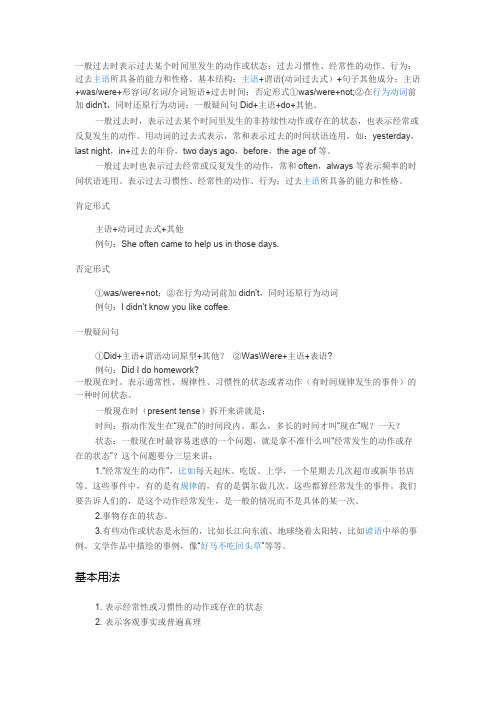
一般过去时表示过去某个时间里发生的动作或状态;过去习惯性、经常性的动作、行为;过去主语所具备的能力和性格。
基本结构:主语+谓语(动词过去式)+句子其他成分;主语+was/were+形容词/名词/介词短语+过去时间;否定形式①was/were+not;②在行为动词前加didn't,同时还原行为动词;一般疑问句Did+主语+do+其他。
一般过去时,表示过去某个时间里发生的非持续性动作或存在的状态,也表示经常或反复发生的动作。
用动词的过去式表示,常和表示过去的时间状语连用,如:yesterday,last night,in+过去的年份,two days ago,before,the age of等。
一般过去时也表示过去经常或反复发生的动作,常和often,always等表示频率的时间状语连用。
表示过去习惯性、经常性的动作、行为;过去主语所具备的能力和性格。
肯定形式主语+动词过去式+其他例句:She often came to help us in those days.否定形式①was/were+not;②在行为动词前加didn't,同时还原行为动词例句:I didn't know you like coffee.一般疑问句①Did+主语+谓语动词原型+其他?②Was\Were+主语+表语?例句:Did I do homework?一般现在时。
表示通常性、规律性、习惯性的状态或者动作(有时间规律发生的事件)的一种时间状态。
一般现在时(present tense)拆开来讲就是:时间:指动作发生在“现在”的时间段内。
那么,多长的时间才叫“现在”呢?一天?状态:一般现在时最容易迷惑的一个问题,就是拿不准什么叫“经常发生的动作或存在的状态”?这个问题要分三层来讲:1.“经常发生的动作”,比如每天起床、吃饭、上学,一个星期去几次超市或新华书店等。
这些事件中,有的是有规律的,有的是偶尔做几次。
英语一般过去时语法知识点

英语一般过去时语法知识点英语一般过去时(Simple Past Tense)是表示过去某个时间发生或存在的动作或状态的一种时态。
以下是英语一般过去时的语法知识点:1. 句子结构:主语+ 动词过去式+ 其他成分。
2. 动词过去式的构成:- 一般情况下,直接在动词原形后面加-ed。
例如:play →played,watch →watched,want →wanted。
- 以不发音的字母“e”结尾的动词,在加-ed前先去掉“e”。
例如:live →lived,change →changed。
- 以辅音字母+y结尾的动词,将y变为i再加-ed。
例如:study →studied,carry →carried。
- 一些不规则动词的过去式需要记忆,例如:go →went,eat →ate,see →saw,do →did。
3. 动词过去式的否定和疑问形式:- 否定形式:主语+ did not + 动词原形+ 其他成分。
缩写为didn't。
例如:I didn't play tennis yesterday.- 疑问形式:Did + 主语+ 动词原形+ 其他成分例如:Did you watch the movie last night?4. 一般过去时的时间状语:昨天(yesterday)、上个月(last month)、去年(last year)等表示过去某个具体时间的时间状语。
5. 一般过去时的用法:- 表示过去某个具体时间发生的动作或状态。
例如:I went to the beach yesterday.- 表示过去一段时间内发生的动作或状态。
例如:I lived in London for two years.- 表示过去习惯性的动作或状态。
例如:When I was a child, I always played with my friends.以上就是英语一般过去时的语法知识点。
记得多加练习,熟练掌握一般过去时的用法。
高中英语语法一般过去时详细讲解
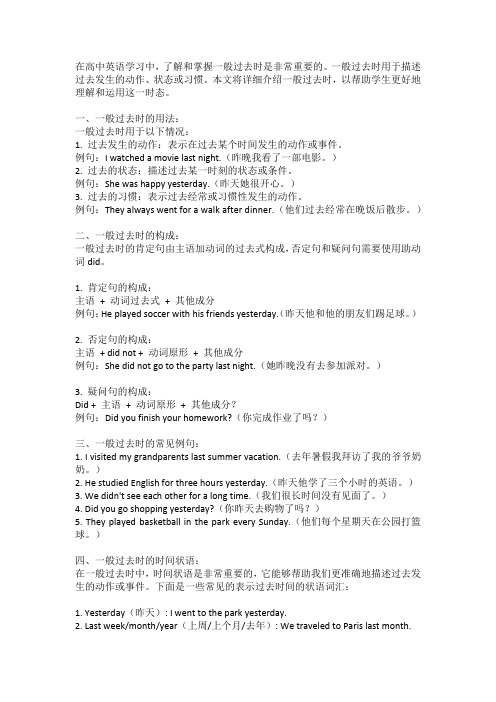
在高中英语学习中,了解和掌握一般过去时是非常重要的。
一般过去时用于描述过去发生的动作、状态或习惯。
本文将详细介绍一般过去时,以帮助学生更好地理解和运用这一时态。
一、一般过去时的用法:一般过去时用于以下情况:1. 过去发生的动作:表示在过去某个时间发生的动作或事件。
例句:I watched a movie last night.(昨晚我看了一部电影。
)2. 过去的状态:描述过去某一时刻的状态或条件。
例句:She was happy yesterday.(昨天她很开心。
)3. 过去的习惯:表示过去经常或习惯性发生的动作。
例句:They always went for a walk after dinner.(他们过去经常在晚饭后散步。
)二、一般过去时的构成:一般过去时的肯定句由主语加动词的过去式构成,否定句和疑问句需要使用助动词did。
1. 肯定句的构成:主语+ 动词过去式+ 其他成分例句:He played soccer with his friends yesterday.(昨天他和他的朋友们踢足球。
)2. 否定句的构成:主语+ did not + 动词原形+ 其他成分例句:She did not go to the party last night.(她昨晚没有去参加派对。
)3. 疑问句的构成:Did + 主语+ 动词原形+ 其他成分?例句:Did you finish your homework?(你完成作业了吗?)三、一般过去时的常见例句:1. I visited my grandparents last summer vacation.(去年暑假我拜访了我的爷爷奶奶。
)2. He studied English for three hours yesterday.(昨天他学了三个小时的英语。
)3. We didn't see each other for a long time.(我们很长时间没有见面了。
一般过去时_小学六年级英语

一般过去时讲解一. 概念一般过去时表示过去某一时间发生的动作或存在的状态。
常和yesterday,last week(year),three days(weeks) ago,in 2003等时间状语连用。
二.一般过去时有下面三种用法:1.表示过去的动作或状态:I bought the hat yesterday.昨天我买了这顶帽子。
He was at school last Monday.上星期一他在上学。
2.表示过去的习惯动作:When he was at school, he wrote a dairy every day.他上学时,每天写一篇日记。
I used to get up early.我以前习惯早起。
注:"used to+动词原形"表示过去某一段时间内有规律的习惯。
3.表示过去发生的一连串的动作:The students got up early in the morning, did their morning exercise, fetched water, swept the floor and then studied English.学生们一早起来,做早操,打水,扫地,然后学英语。
三. 构成(1)主语+be动词(was,were)+其它。
当主语为第一、三人称单数时,be动词用was,主语为其它人称时,be动词一律用were。
如:I(He,She) was in Grade 5 last year.They were students two years ago.(2) 主语+行为动词过去式(无人称和数的变化)。
如:We played football yesterday. Mr Li went to Shanghai last Sunday.3.变化形式:A.一般在动词词尾加ed。
例如:play—played clean—cleaned visit—visitedB.动词末尾字母是e的,在e后直接加d。
完整版)一般过去时的讲解
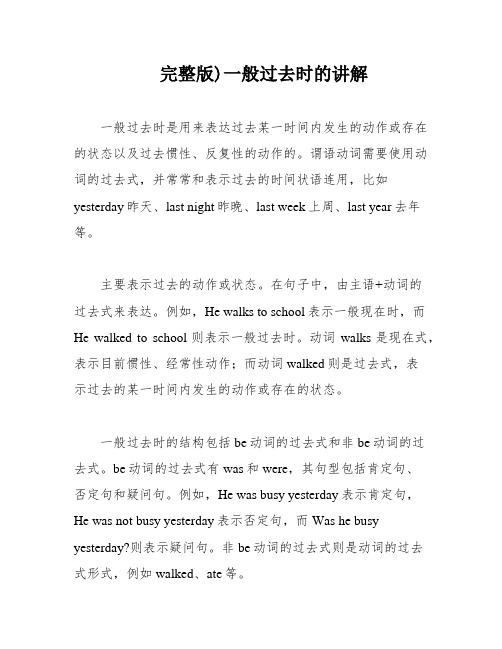
完整版)一般过去时的讲解一般过去时是用来表达过去某一时间内发生的动作或存在的状态以及过去惯性、反复性的动作的。
谓语动词需要使用动词的过去式,并常常和表示过去的时间状语连用,比如yesterday昨天、last night昨晚、last week上周、last year去年等。
主要表示过去的动作或状态。
在句子中,由主语+动词的过去式来表达。
例如,He walks to school表示一般现在时,而He walked to school则表示一般过去时。
动词walks是现在式,表示目前惯性、经常性动作;而动词walked则是过去式,表示过去的某一时间内发生的动作或存在的状态。
一般过去时的结构包括be动词的过去式和非be动词的过去式。
be动词的过去式有was和were,其句型包括肯定句、否定句和疑问句。
例如,He was busy yesterday表示肯定句,He was not busy yesterday表示否定句,而Was he busy yesterday?则表示疑问句。
非be动词的过去式则是动词的过去式形式,例如walked、ate等。
需要注意的是,There is (are)的句型用于一般过去时需要把is、are变为它们的过去式,即There was (were)。
否定句的结构和现在时一样,在be动词过去式(was、were)后面加上not即可,而was not和were not则通常使用缩写形式wasn’t和weren’t。
一般是在词尾加上-ed,如play-played,watch-watched等。
但也有一些规则动词需要变化,如go-went,have-had等。
I wasn’t busy the other day。
A few days ago。
I had somefree time.Was it raining in Beijing yesterday?Yes。
it was.No。
一般过去时用法及概念

一般过去时的用法及概念在英语语法中,一般过去时是一个重要的时间表达方式。
它主要用于描述过去发生的事情,或者在过去某个特定时间点完成的动作。
理解和掌握一般过去时的用法和概念对于提高英语水平具有重要意义。
一、一般过去时的概念一般过去时是一种动词时态,表示在过去某个时间或时间段内发生的动作或存在的状态。
这个时态的主要标志是动词的一般过去式形式,即动词原形后面加-ed。
二、一般过去时的用法1. 描述过去的事实或情况:例如,“Yesterday, I went to the park.”(昨天,我去了公园。
)2. 表示过去习惯性的动作:例如,“When I was a child, I always played football with my friends after school.”(当我还是个孩子的时候,放学后我总是和朋友们一起踢足球。
)3. 用于叙述故事或讲述过去的历史事件:例如,“In 1969, Neil Armstrong walked on the moon for the first time in human history.”(1969年,尼尔·阿姆斯特朗首次在人类历史上在月球上行走。
)三、一般过去时的构成一般过去时通常由主语+动词的一般过去式+宾语组成。
动词的一般过去式是在动词原形的基础上加上-ed。
但需要注意的是,有些不规则动词的过去式形式需要特殊记忆,例如go的过去式是went,eat的过去式是ate等。
四、一般过去时的否定句和疑问句在一般过去时的否定句中,我们使用助动词did not(didn't)+动词原形。
例如,“I didn't eat breakfast this morning.”(今天早上我没有吃早餐。
)在一般过去时的疑问句中,我们同样使用助动词did,将did提到主语之前。
例如,“Did you go to the party last night?”(你昨晚去参加聚会了吗?)。
初中英语语法讲解:一般过去时的用法
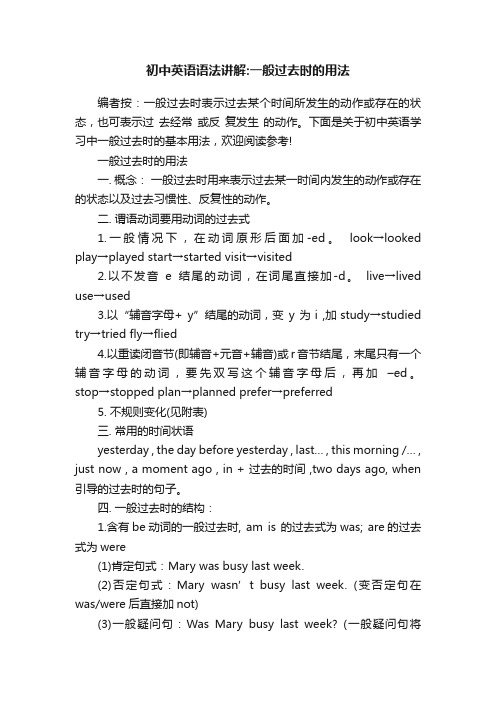
初中英语语法讲解:一般过去时的用法编者按:一般过去时表示过去某个时间所发生的动作或存在的状态,也可表示过去经常或反复发生的动作。
下面是关于初中英语学习中一般过去时的基本用法,欢迎阅读参考!一般过去时的用法一. 概念:一般过去时用来表示过去某一时间内发生的动作或存在的状态以及过去习惯性、反复性的动作。
二. 谓语动词要用动词的过去式1.一般情况下,在动词原形后面加-ed。
look→looked play→played start→started visit→visited2.以不发音e结尾的动词,在词尾直接加-d。
live→lived use→used3.以“辅音字母+ y”结尾的动词,变y 为i ,加study→studied try→tried fly→flied4.以重读闭音节(即辅音+元音+辅音)或r音节结尾,末尾只有一个辅音字母的动词,要先双写这个辅音字母后,再加–ed。
stop→stopped plan→planned prefer→preferred5. 不规则变化(见附表)三. 常用的时间状语yesterday , the day before yesterday , last… , this morning /… , just now , a moment ago , in + 过去的时间 ,two days ago, when 引导的过去时的句子。
四. 一般过去时的结构:1.含有be动词的一般过去时, am is 的过去式为was; are的过去式为were(1)肯定句式:Mary was busy last week.(2)否定句式:Mary wasn’t busy last week. (变否定句在was/were后直接加not)(3)一般疑问句:Was Mary busy last week? (一般疑问句将was/were动词提至句首)Yes, she was. No, she wasn’t(4)特殊疑问句: How was Mary last week?注:在这种构成中,be动词有人称和数的变化,即要根据主语选用was / were。
一般过去时详解(重点)

一般过去时详解(重点)一般过去时是表示过去发生的事情,因此常用的时间状语有yesterday。
last night。
last week。
last year等。
在句子中,肯定句要用动词的过去式,否定句和疑问句则要使用助动词did和didn’t。
一、一般过去时的概念:一般过去时用于描述过去某一时间内发生的动作或存在的状态,以及过去惯性、反复性的动作。
常与表示过去的时间状语连用,如yesterday、last night、last week、last year等。
二、一般过去时的结构:(可分三类不同的结构)1.Be动词的一般过去时在没有实义动词的句子中使用be动词,am和is的过去式为was,而are的过去式为were。
在句子中,肯定句式为主语+be(was。
were)+其它,否定句式为主语+be(was。
were)+not+其它,一般疑问句式为Be(was。
were)+主语+其它。
需要注意的是,be动词有人称和数的变化,即要根据主语选用was/were。
2.实义动词的一般过去时态在实义动词的肯定句中,要使用动词的过去式;而在否定句和疑问句中,则要使用助动词do和does的过去式did。
具体来说,肯定句式为主语+动词(过去式)+其它,否定句式为主语+didn’t+动词(原形)+其它(did not=didn’t),一般疑问句式为Did+主语+动词(原形)+其它(do、does的过去时均为did)。
需要注意的是,did和didn’t是构成一般过去时的助动词,其后要跟动词的原形。
3.情态动词的一般过去时态含有情态动词的一般过去时与含有Be动词的一般过去时十分相似。
在句子中,肯定句式为主语+情态动词+其它,否定句式为主语+情态动词+not+其它,一般疑问句式为情态动词+主语+其它。
需要注意的是,情态动词的过去式有一定的规律:can→could,may→might,must→must,will→would,should→should。
一般过去时全文

3.一般疑问句:Be动词 / Did+主语+动词原形+其 他?
如:Were you in school last Friday? Did your mother cook dinner last night? Did you wash your clothes last Sunday?
4.特殊疑问句:特殊疑问词+一般疑问句? 如:I was at home yesterday. → Where were you yesterday?
2. 用所给动词的适当形式填空。 (1)Did you _p_l_a_y_ (play) the piano yesterday? (2)I _w_r_o_t_e (write) a letter last night. (3)Who _c_l_e_a_n_e_d_ (clean) the window yesterday? (4)Sarah__ra_n__ (run) to school this morning. (5)Tom _w_e_n_t_ (go) to the park last Sunday.
1. It
(be) Mary's birthday last Friday.
2. We all
(have) a good time last night.
解析:本题考查动词的过去式。1,2小题中的时间词
last Friday 和last night 都2. had
3. meet _m_e_t__ 6. teach _ta_u_g_h_t 9. fly _f_le_w__ 12. drive _d_r_o_v_e 15. tell _t_o_l_d_
二、用括号内所给动词的适当形式填空。 1. Tom and Mary _c_a_m_e_(come) to China last month. 2. Mary _r_e_a_d_(read) English yesterday morning. 3. There _w_e_r_e_(be) no children here ten minutes ago. 4. What __d_id__ you __d_o__ the day before yesterday?(do) 5. Last week wep_i_c_ke_d_(pick) many apples on the farm.
一般过去时用法描述

一般过去时用法描述一般过去时是英语的一种时间态,用于描述过去发生的动作、事件或状态。
在一般过去时中,动词的原形一般会在其后加上-ed或-d的形式。
在此时间态下,我们可以使用一般过去时来描述过去的经历、习惯、事实、状况和行为等。
首先,一般过去时可以用来描述过去的经历和事件。
比如,我们可以说"I visited Paris last year."(我去年去过巴黎)来描述去年的一次旅行经历。
又如"I ate at that restaurant many times."(我在那家餐厅吃过很多次)来描述过去的多次用餐经历。
其次,一般过去时也可以用来描述过去的习惯和惯例。
比如,我们可以说"She always walked to work."(她过去总是步行去上班)来形容一个人过去的通勤方式。
又如"They played soccer every Sunday."(他们过去每个星期天都踢足球)来表达一种过去的例行活动。
此外,一般过去时还可以描述过去的事实和状况。
比如,我们可以说"The sun set in the west."(太阳在西方落下)来描述普遍存在的自然现象。
又如"We lived in that house for ten years."(我们在那所房子里住了十年)来描述一种过去的居住状况。
最后,一般过去时还可以用来描述过去的行为和动作。
比如,我们可以说"He ran to catch the bus."(他跑着去赶公交车)来描述一次过去的奔跑动作。
又如"Theyplayed tennis yesterday."(他们昨天打网球)来形容一次过去的运动活动。
需要注意的是,一般过去时表示的动作或事件一般发生在过去的某个具体时间点或一段时间内。
一般过去时的知识点归纳
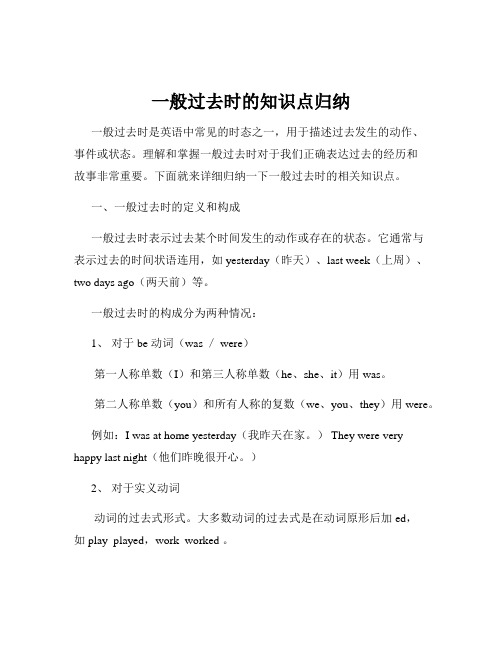
一般过去时的知识点归纳一般过去时是英语中常见的时态之一,用于描述过去发生的动作、事件或状态。
理解和掌握一般过去时对于我们正确表达过去的经历和故事非常重要。
下面就来详细归纳一下一般过去时的相关知识点。
一、一般过去时的定义和构成一般过去时表示过去某个时间发生的动作或存在的状态。
它通常与表示过去的时间状语连用,如 yesterday(昨天)、last week(上周)、two days ago(两天前)等。
一般过去时的构成分为两种情况:1、对于 be 动词(was / were)第一人称单数(I)和第三人称单数(he、she、it)用 was。
第二人称单数(you)和所有人称的复数(we、you、they)用 were。
例如:I was at home yesterday(我昨天在家。
) They were very happy last night(他们昨晚很开心。
)2、对于实义动词动词的过去式形式。
大多数动词的过去式是在动词原形后加 ed,如 play played,work worked 。
但也有一些不规则动词,它们的过去式需要特殊记忆,比如 go went,have had ,do did 等。
例如:He played football last weekend(他上周末踢足球了。
) She had a big party last month(她上个月举办了一个大型聚会。
)二、一般过去时的用法1、表示过去某个特定时间发生的动作或存在的状态。
例如:I met him in the street yesterday(昨天我在街上遇见了他。
)2、表示过去经常或反复发生的动作。
例如:He often went swimming when he was a child(他小时候经常去游泳。
)3、在时间、条件状语从句中,表示过去将来的动作。
例如:She said she would come if she had time(她说如果有时间她会来。
一般过去时基本用法

一般过去时基本用法一般过去时是指过去发生的动作或存在的状态。
以下是一般过去时的基本用法:1. 表示过去某个时间发生的动作或存在的状态:- I watched a movie last night.(我昨晚看了一部电影。
)- He lived in New York two years ago.(他两年前住在纽约。
)2. 表示过去习惯性、经常性的动作:- She always drank coffee in the morning.(她过去经常在早上喝咖啡。
)- We usually went swimming on weekends.(我们过去通常在周末去游泳。
)3. 表示过去的事实或真理:- Albert Einstein discovered the theory of relativity.(阿尔伯特·爱因斯坦发现了相对论。
)- The sun rose in the east.(太阳从东方升起。
)4. 表示过去的条件、假设或愿望(在虚拟语气中):- If I had more money, I would have bought a car.(如果我有更多的钱,我就会买一辆车。
)- I wish I could travel around the world.(我希望能环游世界。
)需要注意的是,一般过去时要与适当的时间状语连用,以明确动作发生的时间。
此外,动词在一般过去时中常会发生变化,需要根据主语的人称和数进行变化,如加上-ed、-d、-ied等。
但是也有一些不规则动词,变化形式会有所不同。
一般过去时表示过去个时间发生的动作或存在的状态

一般过去时表示过去个时间发生(d e)动作或存在(d e)状态TPMK standardization office TPMK5AB- TPMK08- TPMK2C- TPMK181.一般过去时表示过去某个时间发生(de)动作或存在(de)状态,常和表示过去(de)时间状语连用.一般过去时也表示过去经常或反复发生(de)动作感谢.2.Be动词在一般过去时中(de)变化:⑴am 和is在一般过去时中变为was.(was not=wasn’t)⑵are在一般过去时中变为were.(were not=weren’t)⑶带有was或were(de)句子,其否定、疑问(de)变化和is, am, are一样,即否定句在was或were后加not,一般疑问句把was或were调到句首.3.句中没有be动词(de)一般过去时(de)句子否定句:didn’t +动词原形,如:Jim didn’t go home yesterday.一般疑问句:在句首加did,句子中(de)动词过去式变回原形.如:Did Jim go home yesterday特殊疑问句:⑴疑问词+did+主语+动词原形如: What did Jim do yesterday⑵疑问词当主语时:疑问词+动词过去式如:Who went to home yesterday动词过去式变化规则:1.一般在动词末尾加-ed,如:pull-pulled, cook-cooked2.结尾是e加d,如:taste-tasted3.末尾只有一个元音字母和一个辅音字母(de)重读闭音节,应双写末尾(de)辅音字母,再加-ed,如:stop-stopped4.以“辅音字母+y”结尾(de),变y为i, 再加-ed,如:study-studied5.不规则动词过去式:am,is-was, are-were, do-did, see-saw, say-said, give-gave, get-got, go-went, come-came, have-had, eat-ate, take-to ok, run-ran, sing-sang, put-put, make-made, read-read, write-wrote, draw-drew, drink-drank, fly-flew, ride-rode, speak-s poke, sweep-swept, swim-swam, sit-sat过去时练习写出下列动词(de)过去式is\am_________ fly_______ plant________ are ________drink_________ play_______ go________ make ________does_________ dance________ worry________ ask _____taste_________ eat__________ draw________ put ______throw________ kick_________ pass_______ do ________Be动词(de)过去时练习(1)Name ____________ No. ______ Date __________一、用be动词(de)适当形式填空1. I _______ at school just now.2. He ________ at the camp last week.3. We ________ students two years ago.4. They ________ on the farm a moment ago.5. Yang Ling ________ eleven years old last year.6. There ________ an apple on the plate yesterday.7. There ________ some milk in the fridge on Sunday.8. The mobile phone _______ on the sofa yesterday evening.二、句型转换1. It was exciting.否定句:________________________________________________ 一般疑问句:____________________________________________ 肯、否定回答:__________________________________________ 2. All the students were very excited.一般疑问句:____________________________________________肯、否定回答:__________________________________________3. They were in his pocket.否定句:________________________________________________一般疑问句:____________________________________________肯、否定回答:__________________________________________Be动词(de)过去时练习(2)Name ____________ No. ______ Date __________一、用be动词(de)适当形式填空1. I ______ an English teacher now.2. She _______ happy yesterday.3. They _______ glad to see each other last month.4. Helen and Nancy ________ good friends.5. The little dog _____ two years old this year.6. Look, there ________ lots of grapes here.7. There ________ a sign on the chair on Monday..8. Today _____ the second of June. Yesterday ______ the first of June. It _____ Children’s Day. All the students ______ very excited.二、句型转换1. There was a car in front of the house just now.否定句:________________________________________________一般疑问句:____________________________________________肯、否定回答:__________________________________________三、中译英1.我(de)故事书刚才还在手表旁边.___________________________________________________________ 2.他们(de)外套上个礼拜放在卧室里了.___________________________________________________________ 3.一会以前花园里有两只小鸟.___________________________________________________________ 行为动词(de)过去时练习(1)Name ____________ No. ______ Date __________一、用行为动词(de)适当形式填空1. He _________ (live) in Wuxi two years ago.2. The cat ________ (eat) a bird last night.3. We _______ (have) a party last Halloween.4. Nancy ________ (pick) up oranges on the farm last week.5. I ________ (make) a model ship with Mike yesterday.6. They ________ (play) chess in the classroom last PE lesson.7. My mother _______ (cook) a nice food last Spring Festival.8. The girls ________ (sing) and _______ (dance) at the party.二、句型转换1. Su Hai took some photos at the Sports day.否定句:________________________________________________ 一般疑问句:____________________________________________ 肯、否定回答:__________________________________________2. Nancy went to school early.否定句:________________________________________________一般疑问句:____________________________________________肯、否定回答:__________________________________________3. We sang some English songs.否定句:________________________________________________一般疑问句:____________________________________________肯、否定回答:__________________________________________行为动词(de)过去时练习(2)Name ____________ No. ______ Date __________一、用be动词(de)适当形式填空1. I ______ (watch) a cartoon on Saturday.2. Her father _______ (read) a newspaper last night.3. We _________ to zoo yesterday, we _____ to the park. (go)4. ______ you _______ (visit) your relatives last Spring Festival5. ______ he _______ (fly) a kite on Sunday Yes, he ______.6. Gao Shan _______ (pull) up carrots last National Day holiday.7. I ____________ (sweep) the floor yesterday, but my mother ______.8. What ______ she _______ (find) in the garden last morning She __________ (find) a beautiful butterfly.二、句型转换1. They played football in the playground.否定句:________________________________________________一般疑问句:____________________________________________肯、否定回答:__________________________________________三、中译英1. 格林先生去年住在中国.________________________________________________________ 2. 昨天我们参观了农场.________________________________________________________ 3. 他刚才在找他(de).________________________________________________________ 过去时综合练习(1)Name ____________ No. ______ Date __________一、用动词(de)适当形式填空1. It ______ (be) Ben’s birthday last Friday.2. We all ______ (have) a good time last night.3. He ________ (jump) high on last Sports Day.4. Helen ________ (milk) a cow on Friday.5. She likes ______ newspapers, but she ______ a book yesterday. (read)6. He _______ football now, but they _______ basketball just now. (play)7. Jim’s mother _________ (plant) trees just now.8. _______ they ________ (sweep) the floor on Sunday No, they _____.9. I _______ (watch) a cartoon on Monday.10. We ___________ (go) to school on Sunday.二、中译英1. 我们上周五看了一部电影._________________________________________________________ 2. 他上个中秋节走亲访友了吗是(de)._________________________________________________________ 3. 你们上个儿童节做了什么我们参观了动物园._________________________________________________________ 4. 你上周在哪儿在野营基地._________________________________________________________过去时综合练习(2)Name ____________ No. ______ Date __________一、用动词(de)适当形式填空1. It _____ (be) the 2nd of November yesterday.Mr White ________ (go) to his office by car.2. Gao Shan ________ (put) the book on his head a moment ago.3. Don’t ______ the house. Mum _______ it yesterday. (clean)4. What ____ you ______ just now I _______ some housework. (do)5. They _________ (make) a kite a week ago.6. I want to ______ apples. But my dad _______ all of them last month. (pick)7. _______ he ______ the flowers this morning Yes, he _____. (water)8. She ____ (be) a pretty girl. Look, she _____ (do) Chinese dances.9. The students often _________ (draw) some pictures in the art room.10.What ______ Mike do on the farm He ________ cows. (milk)。
一般过去时表示过去某个时间发生的动作或状态

一般过去时表示过去某个时间发生的动作或状态;过去习惯性、经常性的动作、行为;主语在过去时间段所具备的能力和性格。
一般过去时句子最明显的现象就是常由表达过去时间的副词、副词短语或从句“过去”的概念。
例如He was here only a few minutes ago.仅仅几分钟前他还在这里。
I came home just now.我刚回到家。
I got up very early this morning.今天早晨我起床很早。
He was late for school again today.今天他又迟到了。
强化理解:1. 一般过去时表示在过去某个特定时刻或时期所发生的事情,也可以表示过去习惯性、经常性的动作。
一般过去时只说明过去的事情不强调动作对现在的影响。
I had a word with Julia this morning.今天早晨,我跟朱丽亚说了几句话。
He smoked many cigarettes a day until he gave up.他没有戒烟的那阵子,抽烟抽得可凶了。
2. 表示过去一段时间里经常或反复的动作,常与always,never等连用。
Mrs. Peter always carried an umbrella.彼得太太过去老是带着一把伞。
(只是说明她过去的动作,不表明她现在是否常带着)I never drank wine.我以前从不喝酒。
(不涉及到现在,不说明现在是否喝酒)3. 表示过去连续发生的动作时要用一般过去时。
这种情况下句子中往往没有表示过去的时间状语,通过上下文来表示。
The boy opened his eyes for a moment, looked at the captain, and then died.那男孩把眼睛张开了一会儿,看看船长,然后就去世了。
4. 有些句子虽然没有表示过去的时间状语,但实际上发生的动作或存在的状态是指过去,也要用一般过去时。
高考英语 最后冲刺十六种时态用法详解 一般过去时

高考英语最后冲刺十六种时态用法详解一般过去时1. 一般过去时的定义一般过去时表示过去某一时候或某一段时间所发生了的事情或存在的状态。
常与过去时间yesterday, this morning, just now, a moment ago, in May, last night / year / week, once upon a time, the other day, before …, when – clause, in the past连用。
如:What did you do yesterday? 昨天你干了什么?I met Lin Tao this morning. 今天上午我会到了林涛。
I was there a moment ago. 刚才我在那儿。
2. 一般过去时的应用(1) 表示过去某时所发生的动作或存在的状态。
如:Liu Ying was in America last year. 刘英去年在美国。
Jim rang you just now. 吉姆刚才给你打了电话。
(2) 表示过去经常或反复发生的动作。
常接时间副词often, usually, always, sometimes, every day / week, etc. 如:We often went out for a walk after supper. 我们过去常在晚饭后散步。
We usually played together. 我们通常一起玩。
3. 一般过去时对谓语动词的要求一般过去时的谓语动词要用动词的过去式。
动词过去式的构成分规则变化和不规则变化两种形式,不规则变化通常需要逐个记忆,规则变化则遵循以下原则:(1) 一般在动词后加-ed。
如:play—played, offer—offered, weigh—weighed, destroy—destroyed, sign—signed.(2) 在以字母e结尾的动词后,只加-d。
动词的一般过去时

动词的一般过去时动词是语言中最基本、最常用的词类之一,用来表示人、事、物的动作或状态。
在英语中,动词的时态有多种形式,其中一种是一般过去时。
一般过去时用来表示过去发生的或已经完成的动作。
本文将详细介绍动词的一般过去时的用法和规则。
一、一般过去时的基本用法一般过去时用来表达以下几种情况:1. 过去发生的动作:当所描述的动作发生在过去时间中,而与现在时间无关时,使用一般过去时。
例如:- I went to the movies yesterday.(我昨天去看电影了。
)- She cooked dinner last night.(她昨晚煮了晚餐。
)2. 过去存在的状态:用一般过去时表示在过去某一时间内存在的状态。
例如:- They lived in London for five years.(他们在伦敦住了五年。
) - I had a pet dog when I was young.(我小时候养了一只宠物狗。
)3. 过去经常发生的动作:当所描述的动作在过去时间中经常发生,表示习惯性的动作或重复的动作时,使用一般过去时。
例如: - Every morning, he woke up early.(每天早上,他都会早起。
)- We often visited our grandparents during the summer holidays.(暑假期间,我们经常去看望我们的祖父母。
)二、一般过去时的构成规则大多数动词的一般过去时构成规则如下:1. 对于大多数动词,直接在动词原形后加上-ed结尾,即可构成一般过去时。
例如:- talk → talked(谈话→ 谈话了)- play → played(玩→ 玩了)2. 对于以不发音的“e”结尾的动词,只需在动词原形后加上-d结尾。
例如:- dance → danced(跳舞→ 跳舞了)- love → loved(爱→ 爱了)3. 对于以辅音字母+y结尾的动词,变动词原形中的-y为-i,然后再加-ed。
一般过去时:简单地说是表示过去发生的动作或存在的状态

一般过去时:简单地说是表示过去发生的动作或存在的状态。
我们首先来看看一般现在时的构成。
一般现在时的构成:a. be动词过去式的句式。
否定句是在was/were后面加not,was not (wasn't)/were not (weren't)。
一般疑问句是把was / were提前并放到句首,要求首字母要大写。
b.实义动词过去式的句式。
①肯定式:主语+动词过去式+其它。
如:They had a good time yesterday.②否定式:主语+did not(didn't)+动词原形+其它。
如:They didn't watch TV last night.③一般疑问句:Did+主语+动词原形+其它?肯定回答:Yes,主语+did.否定回答:No,主语+didn't. 如:Did they have a meeting two days ago? Yes,they did. / No,they didn't.④特殊疑问句:特殊疑问词+did+主语+动词原形+其它?如:What time did you finish your homework?知道了一般现在时的构成,我们在看看在什么情况下,我们才能使用它。
一般过去时的用法:①一般过去时的基本用法a)表示过去某个特定时间发生的动作或存在的状态。
He suddenly fell ill yesterday.昨天他突然生病了。
The engine stopped because the fuel was used up.发动机因燃料用光而停机了。
b)表示过去经常发生的动作或存在的状态。
I wrote home once a week at college.我上大学时每周给家里写一封信。
He was already in the habit of reading widely in his boyhood.他童年时就养成了广泛阅读的习惯。
一般过去时基本概念

一般过去时基本概念一般过去时(simple past tense)表示过去某个时间里发生的动作或存在的状态;过去习惯性、经常性的动作、行为;主语过去所具备的能力和性格。
时间状语Ago(two hours ago(一段时间+ago),yesterday(句子开头或结尾),the day before yesterday,last week,last(year,night,month…),具体时间(如Jan.fourth),just now,at the age of,one day,long ago,once upon a time(很久以前),and so on,this morning.long long ago.动词变化规则规则变:1.直接加ed:work—— worked look——looked play——played,2.以不发音e结尾的单词,直接加d:live ——lived hope——hoped use——used,3 以辅音字母+y结尾的,变y为i加ed:study——studied carry——carried worry——worried,4以元音字母+y结尾的,直接加ed:enjoy ——enjoyed play——played5 以重读闭音节结尾的,双写最后的辅音字母+ed:stop—— stopped plan——planned不规则变化:......基本结构主语+动词过去式+其他.否定形式①was/were+not;②在行为动词前加didn't,同时还原行为动词一般疑问句①Did+主语+do+其他?②Was\Were+sb.+ do sth例句She often came to help us in those days.I didn't know you were so busy.一般过去式的构成形式用法(1)一般过去时表示在过去某个特定时间发生,也可以表示过去习惯性、经常性的动作。
【英语知识点】初中英语一般过去时知识点整理

【英语知识点】初中英语一般过去时知识点整理一般过去时表示过去某一时候或某一段时间所发生了的事情或存在的状态。
常与过去时间yesterday, this morning, just now, a moment ago, in May, last night / year / week, once upon a time, the other day, before …, when – clause, in thepast连用。
1.表示在过去某个时间所发生的动作或所处的状态。
常与yesterday, last week, in 1989, just now, a moment ago, the other day等连用。
如:He was here just now. 他刚才还在这里。
2.在过去一段时间内的经常性或习惯性动作。
如:We often played together when we were children. 我们小时候常在一起玩。
注:表示过去经常发生的动作还可用used to 和would。
3.表示主语过去的特征或性格。
如:At that time she was very good at English. 那时她英语学得很好。
4.用在状语从句中表示过去将来。
如:He said he would wait until they came back.5.一般过去时有时可以表示现在,多与 want, hope, wonder, think, intend 等动词连用,使语气更委婉。
如:I wondered if you could help me. 不知你能不能帮我一下。
注:有时用一般过去时也是时态一致的需要。
注意:1. 表示一系列的动作,尽管有先后,都用一般过去时,最后两个动词之间用and连结。
如: He opened the door, rushed out and then disappeared. 他打开门,冲了出去,然后就消失了。
- 1、下载文档前请自行甄别文档内容的完整性,平台不提供额外的编辑、内容补充、找答案等附加服务。
- 2、"仅部分预览"的文档,不可在线预览部分如存在完整性等问题,可反馈申请退款(可完整预览的文档不适用该条件!)。
- 3、如文档侵犯您的权益,请联系客服反馈,我们会尽快为您处理(人工客服工作时间:9:00-18:30)。
一般过去时表示过去个时间发生的动作或存在的状态TPMK standardization office【 TPMK5AB- TPMK08- TPMK2C- TPMK18】1.一般过去时表示过去某个时间发生的动作或存在的状态,常和表示过去的时间状语连用。
一般过去时也表示过去经常或反复发生的动作感谢。
2.Be动词在一般过去时中的变化:⑴am 和is在一般过去时中变为was。
(was not=wasn’t)⑵are在一般过去时中变为were。
(were not=weren’t)⑶带有was或were的句子,其否定、疑问的变化和is, am, are一样,即否定句在was或were后加no t,一般疑问句把was或were调到句首。
3.句中没有be动词的一般过去时的句子否定句:didn’t +动词原形,如:Jim didn’t go home yesterday.一般疑问句:在句首加did,句子中的动词过去式变回原形。
如:Did Jim go home yesterday?特殊疑问句:⑴疑问词+did+主语+动词原形?如: What did Jim do yesterday?⑵疑问词当主语时:疑问词+动词过去式?如:Who went to home yesterday?动词过去式变化规则:1.一般在动词末尾加-ed,如:pull-pulled, cook-cooked2.结尾是e加d,如:taste-tasted3.末尾只有一个元音字母和一个辅音字母的重读闭音节,应双写末尾的辅音字母,再加-ed,如:st op-stopped4.以“辅音字母+y”结尾的,变y为i,再加-ed,如:study-studied5.不规则动词过去式:am,is-was, are-were, do-did, see-saw, say-said, give-gave, get-got, go-went, come-came, have-had, eat-ate, take-to ok, run-ran, sing-sang, put-put, make-made, read-read, write-wrote, draw-drew, drink-drank, fly-flew, ride-rode, speak-s poke, sweep-swept, swim-swam, sit-sat过去时练习写出下列动词的过去式is\am_________ fly_______ plant________ are ________drink_________ play_______ go________ make ________does_________ dance________ worry________ ask _____taste_________ eat__________ draw________ put ______throw________ kick_________ pass_______ do ________Be动词的过去时练习(1)Name ____________ No. ______ Date __________一、用be动词的适当形式填空1. I _______ at school just now.2. He ________ at the camp last week.3. We ________ students two years ago.4. They ________ on the farm a moment ago.5. Yang Ling ________ eleven years old last year.6. There ________ an apple on the plate yesterday.7. There ________ some milk in the fridge on Sunday.8. The mobile phone _______ on the sofa yesterday evening.二、句型转换1. It was exciting.否定句:________________________________________________ 一般疑问句:____________________________________________ 肯、否定回答:__________________________________________ 2. All the students were very excited.一般疑问句:____________________________________________肯、否定回答:__________________________________________3. They were in his pocket.否定句:________________________________________________一般疑问句:____________________________________________肯、否定回答:__________________________________________Be动词的过去时练习(2)Name ____________ No. ______ Date __________一、用be动词的适当形式填空1. I ______ an English teacher now.2. She _______ happy yesterday.3. They _______ glad to see each other last month.4. Helen and Nancy ________ good friends.5. The little dog _____ two years old this year.6. Look, there ________ lots of grapes here.7. There ________ a sign on the chair on Monday..8. Today _____ the second of June. Yesterday ______ the first of June. It _____ Children’s Day. All the students ______ very excited.二、句型转换1. There was a car in front of the house just now.否定句:________________________________________________一般疑问句:____________________________________________肯、否定回答:__________________________________________三、中译英1.我的故事书刚才还在手表旁边。
___________________________________________________________ 2.他们的外套上个礼拜放在卧室里了。
___________________________________________________________ 3.一会以前花园里有两只小鸟。
___________________________________________________________ 行为动词的过去时练习(1)Name ____________ No. ______ Date __________一、用行为动词的适当形式填空1. He _________ (live) in Wuxi two years ago.2. The cat ________ (eat) a bird last night.3. We _______ (have) a party last Halloween.4. Nancy ________ (pick) up oranges on the farm last week.5. I ________ (make) a model ship with Mike yesterday.6. They ________ (play) chess in the classroom last PE lesson.7. My mother _______ (cook) a nice food last Spring Festival.8. The girls ________ (sing) and _______ (dance) at the party.二、句型转换1. Su Hai took some photos at the Sports day.否定句:________________________________________________ 一般疑问句:____________________________________________ 肯、否定回答:__________________________________________2. Nancy went to school early.否定句:________________________________________________一般疑问句:____________________________________________肯、否定回答:__________________________________________3. We sang some English songs.否定句:________________________________________________一般疑问句:____________________________________________肯、否定回答:__________________________________________行为动词的过去时练习(2)Name ____________ No. ______ Date __________一、用be动词的适当形式填空1. I ______ (watch) a cartoon on Saturday.2. Her father _______ (read) a newspaper last night.3. We _________ to zoo yesterday, we _____ to the park. (go)4. ______ you _______ (visit) your relatives last Spring Festival?5. ______ he _______ (fly) a kite on Sunday Yes, he ______.6. Gao Shan _______ (pull) up carrots last National Day holiday.7. I ____________ (sweep) the floor yesterday, but my mother ______.8. What ______ she _______ (find) in the garden last morning She __________ (find) a beautiful butterfly.二、句型转换1. They played football in the playground.否定句:________________________________________________一般疑问句:____________________________________________肯、否定回答:__________________________________________三、中译英1. 格林先生去年住在中国。
